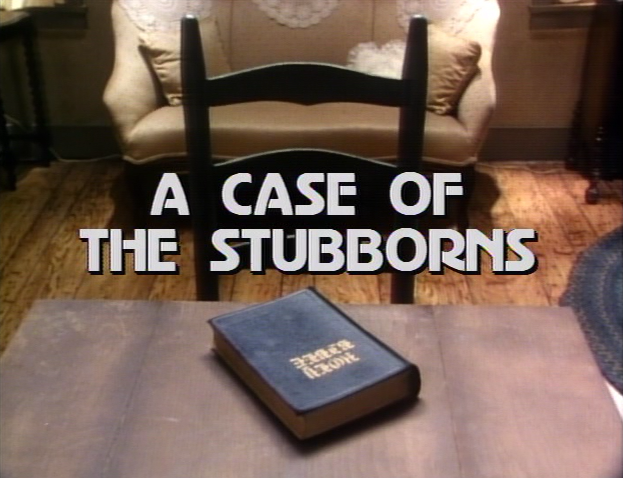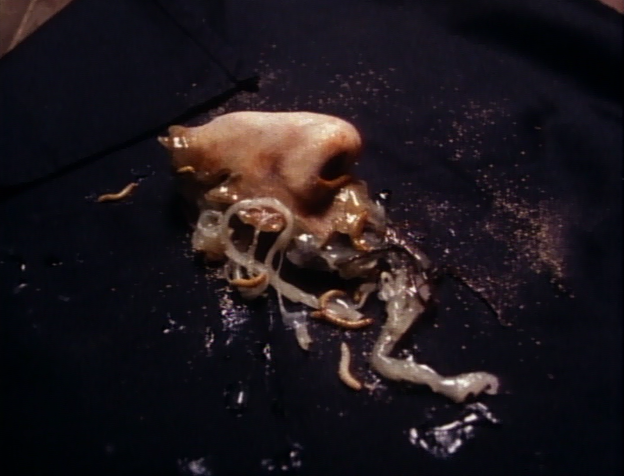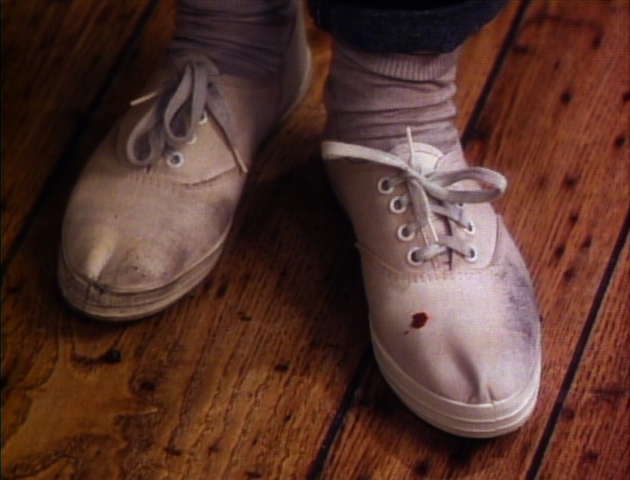Original Airdate: December 13, 1984
Directed by Shelley Levinson.
Written by Haskell Barkin, Based on the story “Djinn, No Chaser” by Harlan Ellison.
Starring Charles Levin (Danny Squires), Colleen Camp (Connie Squires), Kareem Abdul-Jabbar (The Djinn, Jan Bin Jan), Nate Esformes (Mohandus Mukhar).
SYNOPSIS: A day out shopping for Turkish home décor takes an unexpected twist for newlyweds Danny and Connie when they peruse the wares of an Arabian merchant’s tent that has appeared out of nowhere. Connie insists on buying the old rusty lamp that the merchant promises houses a genuine genie, but they soon come to find that the abrasive djinn is only interested in making their lives a living hell.
CRITIQUE: Cause you know I’m all about dat djinn, bout dat djinn
No chaser
I’m all about dat djinn, bout dat djinn…
Curtailing my career as a successful songwriter for just a moment, our next episode of TFTD finds the program venturing further into the humorous territory that was first put forth by the previous segment, “A Case of the Stubborns.” But whereas Bloch’s story was of a decidedly darker and moribund mind, “Djinn, No Chaser” is clearly in the realm of the zany, patter-filled comedy that one might associate with the classic “screwballs” of the 30s and 40s. But “classic” the episode certainly isn’t.
In all fairness, the segment is perfectly fine, but at times it feels the need to try a little too hard for the laughs. As opposed to “A Case of the Stubborns” where the humor felt of a piece with the story and the characters were colorfully acted, “Djinn” shows its stretch marks from time to time, primarily in the lead performance from Charles Levin. Levin, whose biggest film credits include “Actor in Rehearsal” from ANNIE HALL (1977) and “Television Actor #1” from MANHATTAN (1979), ruthlessly mugs in front of the camera with the apparent philosophy that in spastic facial expressions lies the key to comedy. The fact that he cracks up at his own witticisms only makes the mixture even more unpalatable. Consummate comedienne Camp fares a little better, working mostly as stern foil to the hyperactive Levin, but her role tends to feel overshadowed by her co-star's "hilarious" antics.
 |
| Yeah, that's how we felt too. |
The script, adapted by Haskell Barkin (the IMDb credits a "Haskell Smith" as adapter but the episode's actual credits show Barkin's name--nice try, Haskell!), is promising and filled with many of the sarcastic asides that one would expect from a work of Ellison’s. (“Nervously, they approach the tent,” Connie narrates as they enter the shop.) Many of the insults hurled by the characters in the episode are lifted wholesale from Ellison's story, a wise move considering the author's infamous tirades and snappy criticisms. The scene between Levin and Nate Esformes as the mysterious merchant does work pretty well, with each actor leveling blasphemous curses given modern twists at one another as they haggle over the price of the lamp. Ellison’s vitriolic side gets further exercise in the form of the genie’s own rude remarks to his new owners, at one point colorfully referring to Connie as a “charnel house harlot.” (The mind wonders!)
The turn of the screw that the story rests on—an impoverished couple gets the means to make unlimited wishes only for their lives to get exponentially worse because of the genie’s temper tantrum—is indeed a clever one, and the Squires’ misery is smartly shown rather than having the characters laying it all out for us with a “Oh! If only we hadn’t taken it all for granted!” It’s an idea that’s implicitly understood by the viewer, and it’s nice that it goes uncommented on. The tortures the genie wrecks on the household are amusing and, for the most part, are handled creatively in conjunction with the show’s frugal budget. Naturally, the plagues the djinn visits on the Squires in Ellison's original are much more elaborate and abundant, from bloody floods to indoor lightning. In the episode, some of the more grandiose curses (wild animals marauding in the hallway) are only hinted at, and the original story's ending that finds the couple living in luxury in an opulent Connecticut mansion is toned down in the episode to a return to the small (but cleaner) apartment after the djinn has been freed from his lamp.
With such abundant room for drama and fantasy, there are several sequences in the episode, like Danny’s midnight craving for a glass of milk, that go on for inexcusable durations. It not only brings our attention to the fact that it’s merely padding, but in a rapid-fire, neurotic comedy like this it leaves the madcap rhythm dead in the water. It's a shame that the creative team would resort to these kinds of empty tactics with such a winning concept on their hands. The given circumstances of the program (i.e. its quick shooting schedule) could be blamed, but in light of other episodes utilizing their time slots more wisely that excuse doesn’t have much weight.
"Djinn, No Chaser" ends on a wryly silly note (you can almost hear the “Pop Goes the Weasel” theme from the Three Stooges’ shorts at the climax), marking this episode as diverting if only occasionally amusing fluff.
"Djinn, No Chaser" originally appeared in the April 1982 issue of Rod Serling's The Twilight Zone. Interestingly, Ellison would find himself sharing a space in that issue's fiction section with Dan Simmons' first published work "The River Styx Runs Upstream," the winning entry from the magazine's first contest of submissions from unpublished writers. Simmons notes in his introduction to the story from his collection PRAYERS TO BROKEN STONES Ellison's infamous first reaction to receiving the story at a writer's workshop:
"Who is this Simmons? Stand up, wave your hand, show yourself, goddamnit. What egomaniacal monstrosity has the fucking gall, the unmitigated hubris to inflict a story of five thousand fucking words on this workshop? Show yourself, Simmons!"
His outrage was soon placated by the fact that Simmons' story was actually good, and afterward Ellison even offered to submit the story for TZ's contest himself.
"Djinn, No Chaser" originally appeared in the April 1982 issue of Rod Serling's The Twilight Zone. Interestingly, Ellison would find himself sharing a space in that issue's fiction section with Dan Simmons' first published work "The River Styx Runs Upstream," the winning entry from the magazine's first contest of submissions from unpublished writers. Simmons notes in his introduction to the story from his collection PRAYERS TO BROKEN STONES Ellison's infamous first reaction to receiving the story at a writer's workshop:
"Who is this Simmons? Stand up, wave your hand, show yourself, goddamnit. What egomaniacal monstrosity has the fucking gall, the unmitigated hubris to inflict a story of five thousand fucking words on this workshop? Show yourself, Simmons!"
His outrage was soon placated by the fact that Simmons' story was actually good, and afterward Ellison even offered to submit the story for TZ's contest himself.
"And may all your children need corrective lenses from watching too much TV!"
***
Rating: 2 Lizzies















































